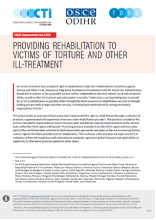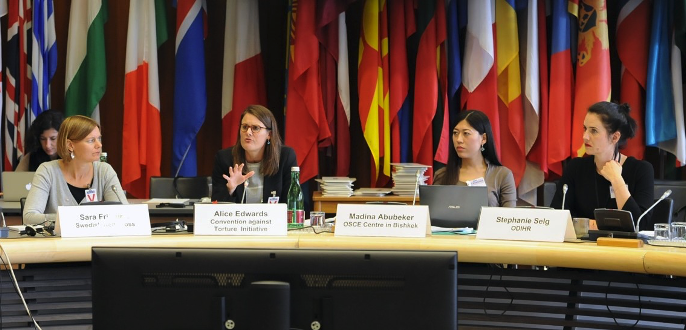Europe
The worldwide fight against torture and ill-treatment is a foremost issue in Europe. As the first region in the world to have achieved complete ratification of the UN Convention against Torture (UNCAT), CTI’s focus in Europe is on rigorous implementation of the Convention and solidifying and exchanging on good practices. Denmark, CTI’s European Core State, is a leading voice championing the global vision of CTI as well as our work in Europe where it has convened and hosted a number of significant events to advance the application of the Convention through dialogue and cooperation.
Reinforcing the global prohibition against torture, a strong regional anti-torture architecture exists. Europe has one of the oldest binding prohibitions against torture in the 1950 European Convention on Human Rights. Additionally, Council of Europe Member States forged ahead by adopting the European Convention for the Prevention of Torture and Inhuman or Degrading Treatment or Punishment, which creates the European Committee for the Prevention of Torture (CPT), an anti-torture body of independent experts with the mandate to visit, monitor and assess the treatment of persons deprived of their liberty and provide recommendations to governments and detention authorities on how to improve conditions and procedures.
Regional ratification across the OSCE
We know from our work on torture prevention that countries that have effective safeguards against torture benefit greatly from them. It not only leads to lower risks of torture and ill-treatment. It also leads to higher levels of confidence among the public in national institutions. It contributes to just and sustainable societies.
H.E. Jeppe Kofod, Minister for Foreign Affairs of Denmark, during CTI’s side-event at the 43rd session of the Human Rights Council in Geneva, February 2020.
In the European Union, the revised 2019 “Guidelines on EU Policy Towards Third Countries on Torture and Other Cruel, Inhuman or Degrading Treatment or Punishment,” call on EU delegations and Member States to work with CTI, encourage UNCAT ratification and implementation in their engagement with third countries, and make torture prevention and response a priority in multilateral human rights fora.
The OSCE/ODIHR has a dedicated Torture Adviser position, supporting the organisation to keep torture prevention on its regional security agenda and carrying out capacity building and awareness raising activities.
The following countries are party to UNCAT and are currently working to implement its requirements domestically:
- All 47 Member States of the Council of Europe (CoE);
- All 27 Member States of the European Union (EU);
- All 57 participating States in the Organization for Security and Co-operation in Europe (OSCE), which includes Canada and the US.
Additionally, a vast majority of States in the region – including 23 in the EU, 38 in the CoE and 41 in the OSCE – have ratified the Optional Protocol to the UN Convention against Torture (OPCAT), and nearly all have put in place independent bodies to visit and monitor places of detention, known as National Preventive Mechanisms.
CTI’s priorities in Europe
In CTI’s partnerships with these European institutions and countries, three specific areas of collaboration have been identified in addition to supporting CTI’s global goals of universal ratification and implementation of UNCAT:
- Expanding the accessibility and quality of rehabilitation services for victims of torture in Europe;
- Raising awareness on the necessity and practical advantages of legal and procedural safeguards specifically in relation to police arrest and custody/detention;
- Promoting rapport-based interviewing techniques to strengthen criminal proceedings and the fairness of judicial outcomes.
Expanding the accessibility and quality of rehabilitation services for victims of torture
Torture and other cruel, inhuman or degrading treatment or punishment can have devastating consequences for victims, their families and the broader community. Rehabilitation helps torture victims and whole societies rebuild their lives and reduces chronic, long-term health problems. States have a duty to provide rehabilitation, either through the direct provision of public rehabilitation services or through funding private medical, legal and other services, including those administered by non-governmental organisations.
CTI has been working in partnership with the OSCE/ODIHR in particular to support the effective and full implementation of victims’ right to rehabilitation. Past activities included:
- A regional meeting held in Copenhagen in June 2016, hosted by the Ministry of Foreign Affairs of Denmark and under Germany’s Chairmanship of the OSCE;
- Two follow-up workshops, in Vienna in October 2016 and in Vienna in June 2018, the latter under the Italian Chairmanship and supported by Denmark and Switzerland. These meetings allowed for cross-regional exchanges of good practices and challenges in providing rehabilitation service models, guaranteeing availability and early access to rehabilitation, service appropriateness and ways to monitor and evaluate impact.
- The joint production of a CTI-OSCE tool gathering good experiences on providing rehabilitation to victims of torture or ill-treatment.

CTI-OSCE UNCAT Implementation Tool 5/2018: Providing rehabilitation to victims of torture and other ill-treatment
Providing rehabilitation to victims of torture and ill-treatment restores physical, mental, social and vocational independence and constitutes one of the components of the right to redress.
Sharing 20 State practices and examples of laws, policy guidance, action plans, types of rehabilitation services and funding models, the tool hopes intends to inspire States to learn from each other in their efforts to improve access, availability and quality of domestic rehabilitation services.

Raising awareness on the necessity and practical advantages of safeguards on arrest and custody/detention
Implementing safeguards against torture and ill-treatment during the initial period of arrest and the first hours of police custody, when the risk of torture and ill-treatment is known to be higher, is one of the most effective prevention strategies.
In March 2018, during its chairpersonship of the Committee of Ministers of the Council of Europe, the Foreign Ministry of Denmark as a CTI Core State convened a seminar in Copenhagen in partnership with the European Committee on the Prevention of Torture and DIGNITY-Danish Institute Against Torture, to explore good practices and challenges in combating torture and ill-treatment through the effective implementation of legal safeguards and non-coercive interviewing methods. Particular focus was given to guaranteeing the rights of arrested individuals to a lawyer, to receive an independent medical examination, and to be able to notify a third party of their arrest/custody.
Promoting rapport-based investigative interviewing techniques
Based on over 30 years of robust scientific evidence, the benefits of so-called “investigative interviewing”, which relies on building rapport with the suspect, are proven and far reaching. Started in the United Kingdom in the 1980s and 1990s in response to a number of miscarriages of justice based on forced confessions, the technique has expanded into other OSCE countries including Canada, Denmark, Iceland, Latvia, the Netherlands, Norway and Sweden. CTI has been promoting it since 2016 as an effective alternative to “confession-oriented interrogation,” which opens doors to misbehaviour, including in resolving high-profile terrorism cases.
→ More details on investigative interviewing.
During CTI’s international and regional seminars and events, leading police and forensic psychology experts, have discussed the benefits of using these non-coercive methods as part of a broader process of supporting fairness, transparency and accountability, and the rule of non-admission of torture-tainted evidence in court proceedings.
To promote and facilitate training of police and other law enforcement officials on the adoption of non-coercive interviewing methods, CTI developed, in partnership with the Norwegian Police University College and the Norwegian Centre for Human Rights of the University of Oslo, a training tool on investigative interviewing for criminal cases.

CTI Training Tool 1/2017 on Investigative Interviewing for Criminal Cases
Using non-coercive, rapport-building methods to question suspects, witnesses and victims (known as “investigative interviewing”) increases the likelihood of suspects disclosing meaningful and reliable information and improves investigations and evidence collection. This tool outlines the benefits and basic stages of the investigative interviewing method and it is available in 9 languages.
Prepared for CTI by the Norwegian Center for Human Rights (NCHR) in cooperation with the Norwegian Police University College, who are leading trainers on this technique around the world, this tool is currently being used in several countries across regions to change policies, practices and trainings.
The tool is available in Arabic, Bahasa Indonesian, English, French, Norwegian, Portuguese, Spanish, Thai, Ukrainian and Vietnamese.
At multilateral level, the EU is a strong supporter of the Convention against Torture Initiative (CTI) set up in 2014 with the aim to achieve global ratification and implementation of the UN Convention against Torture and Other Cruel, Inhuman and Degrading Treatment or Punishment by 2024 through inter-state cooperation and dialogue.
Guidelines on EU Policy Towards Third Countries on Torture and Other Cruel, Inhuman or Degrading Treatment or Punishment, para. 15.

